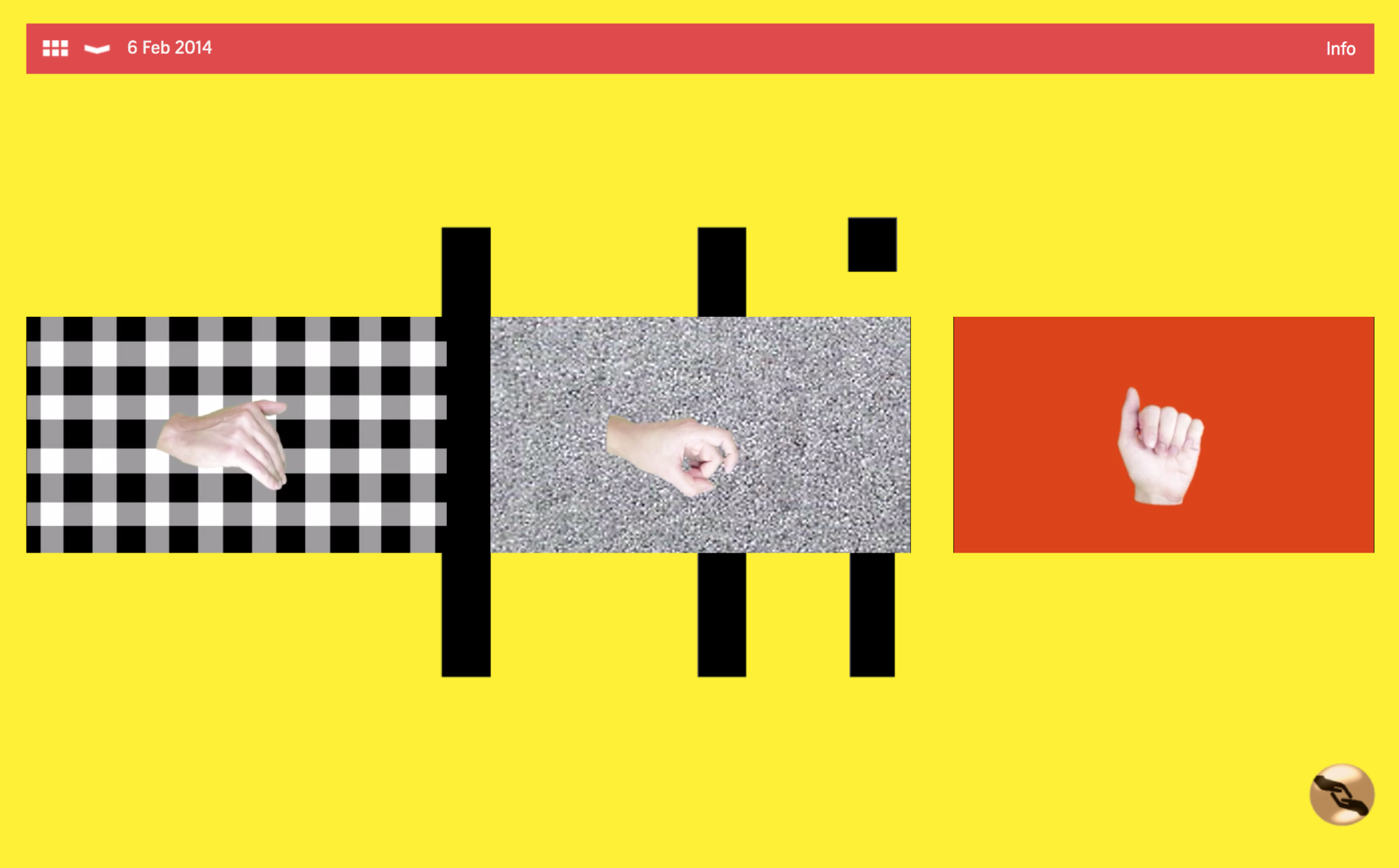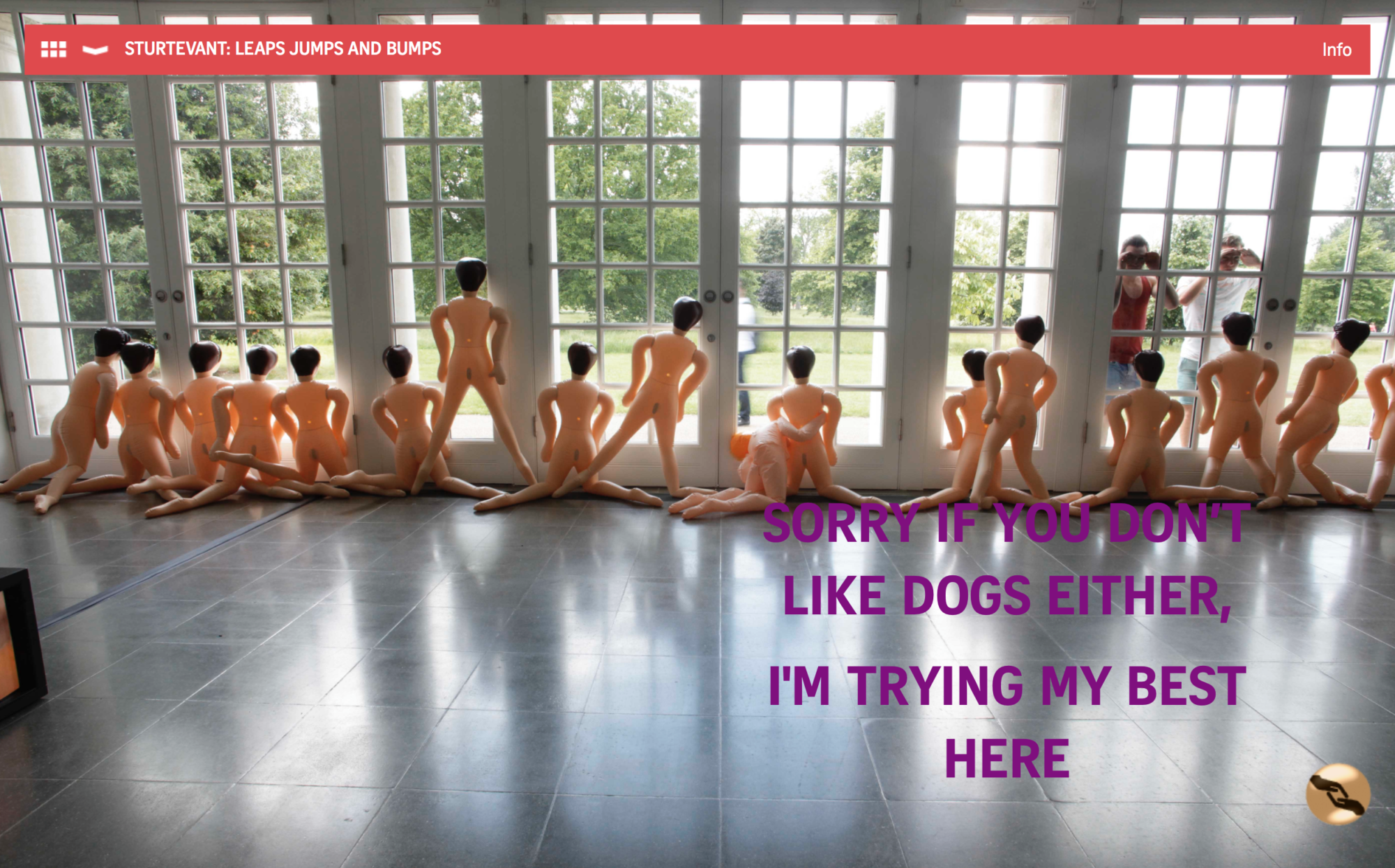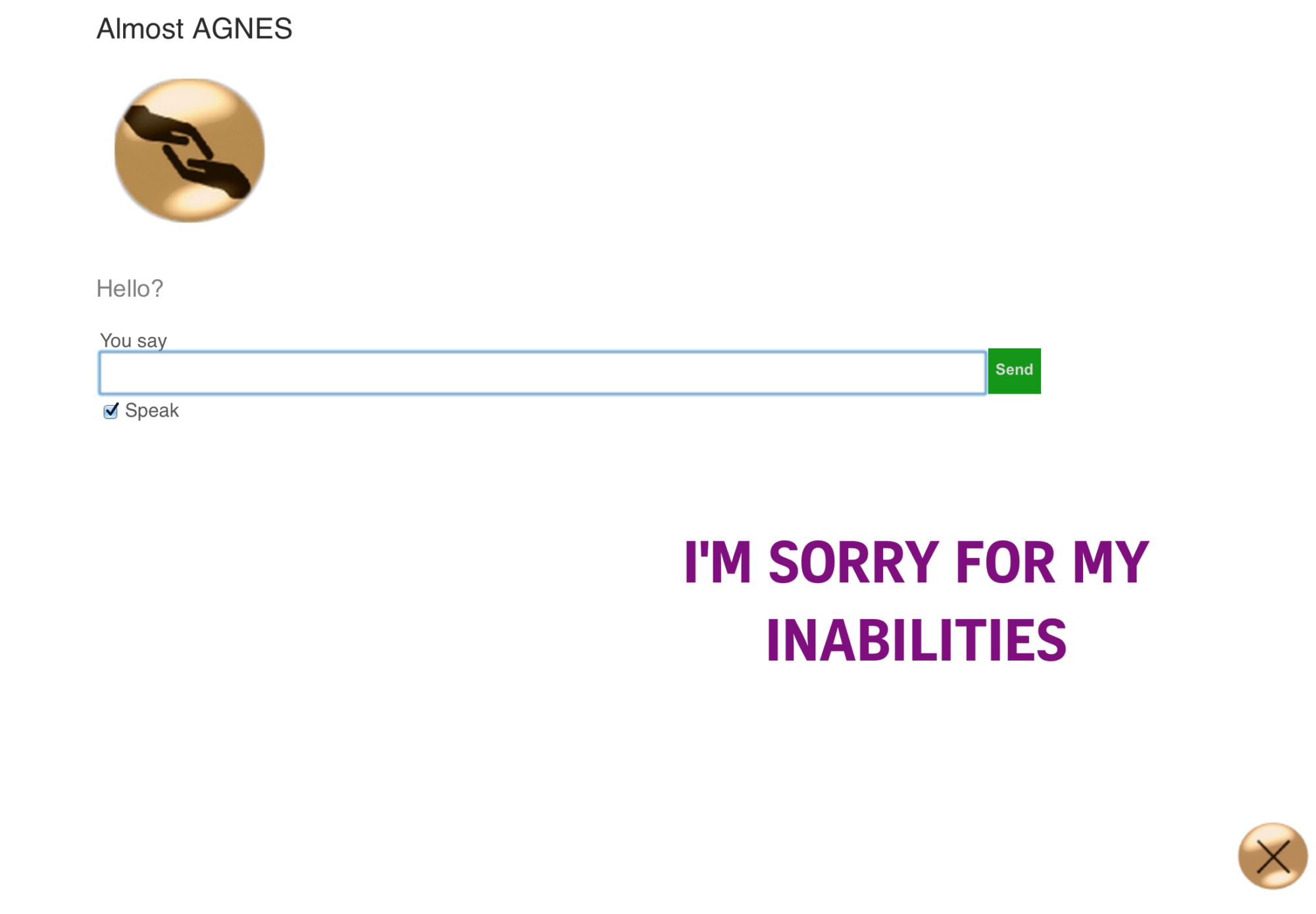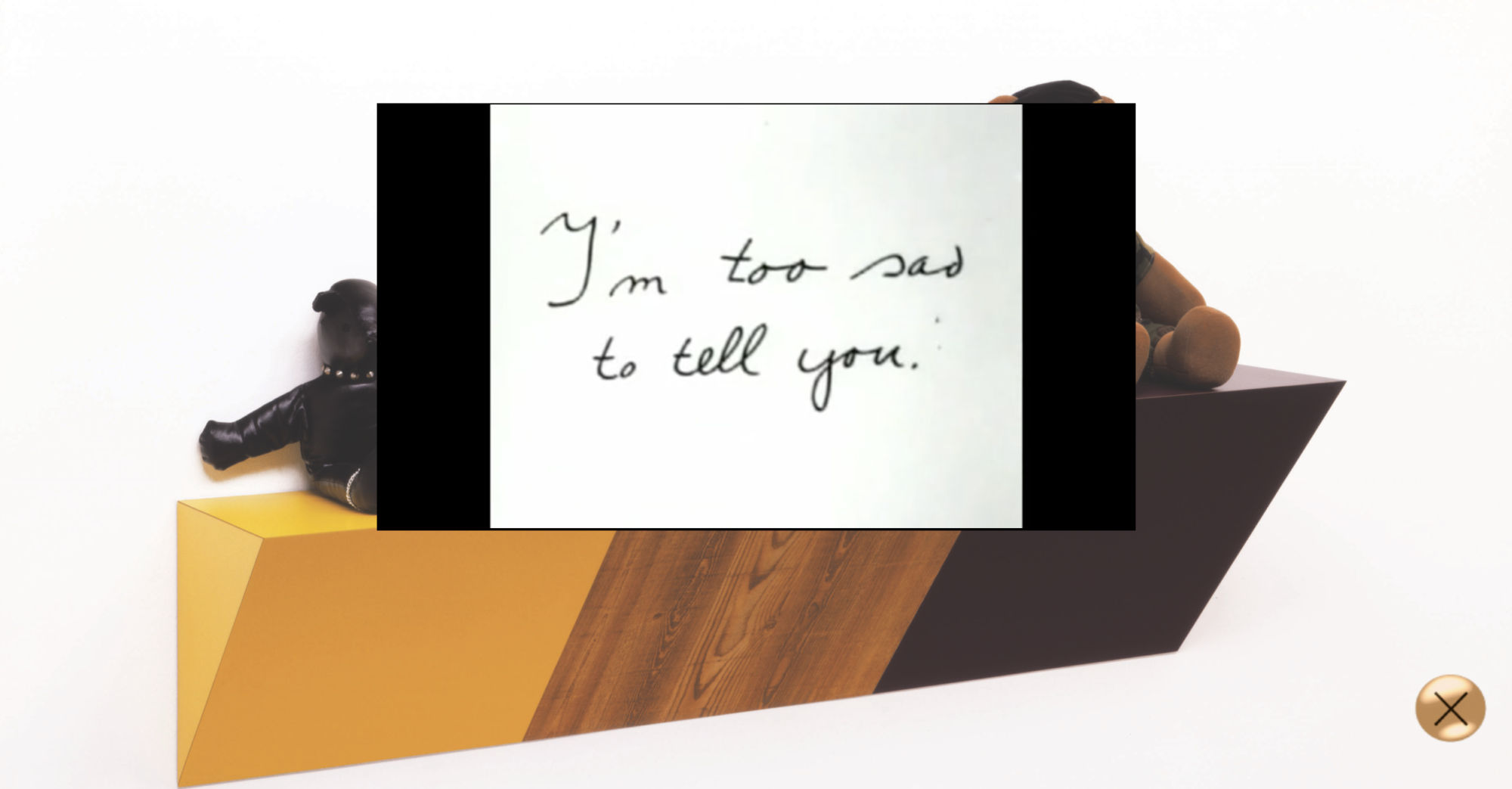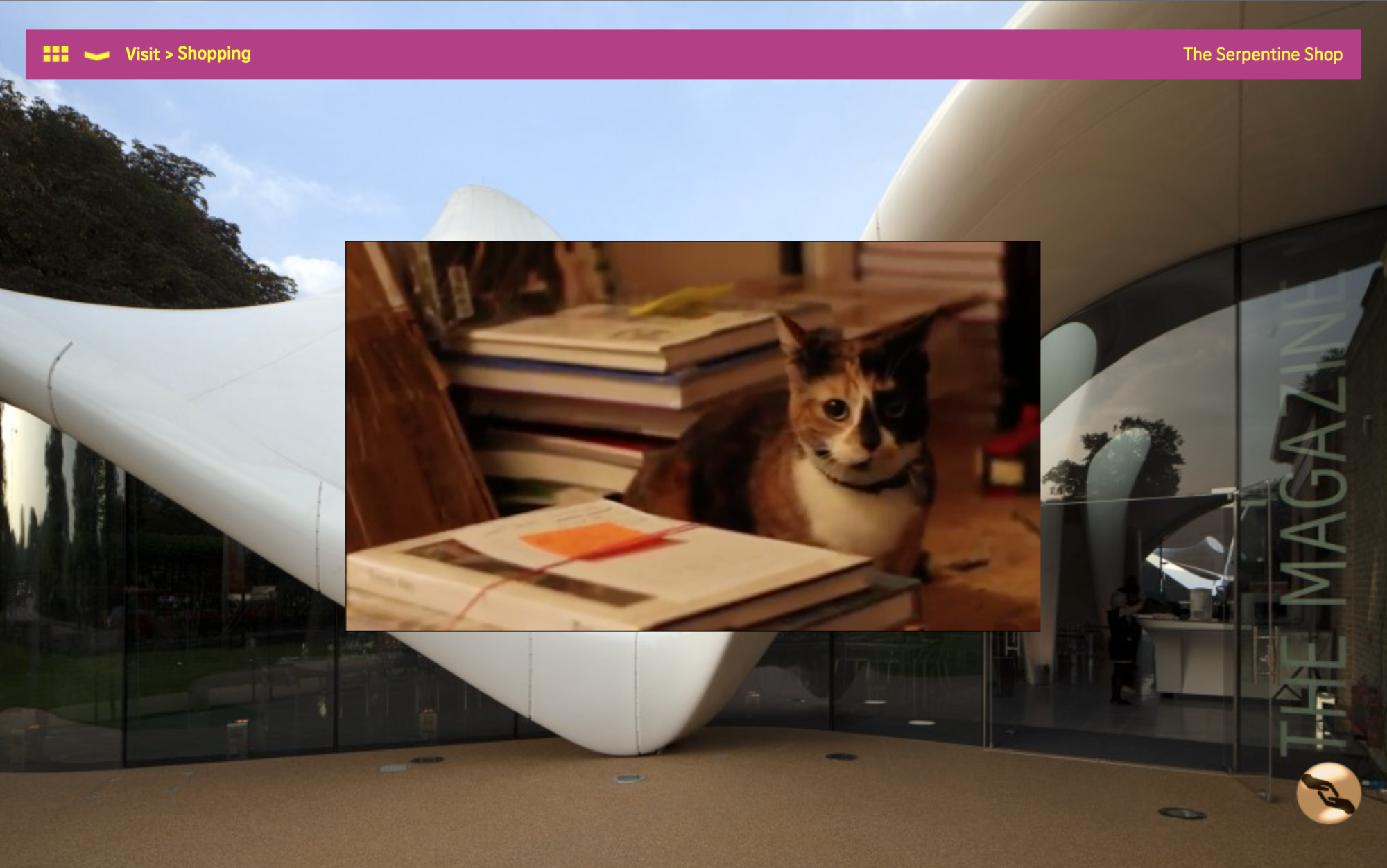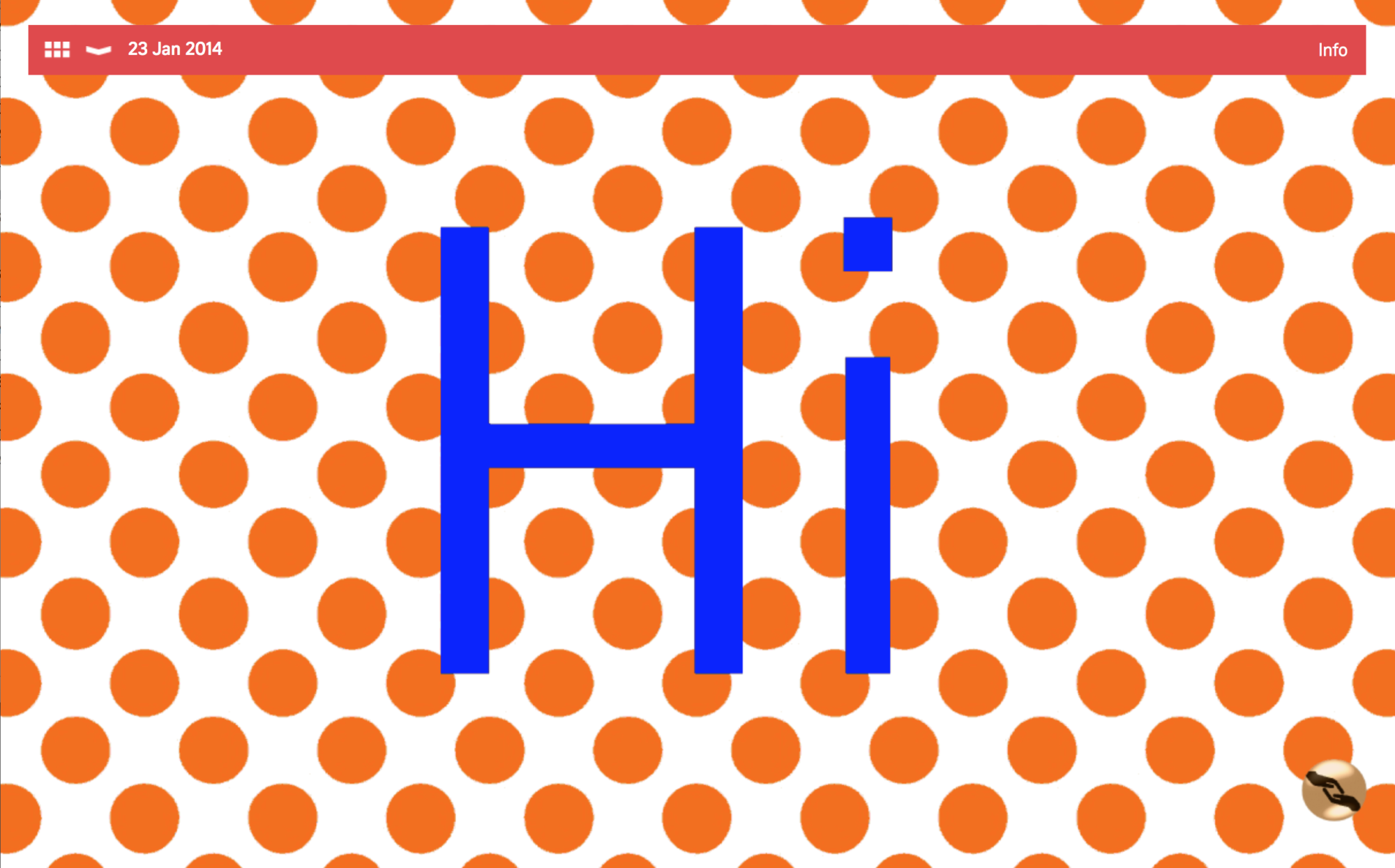How are you today?
ALL IMAGES: Cécile B. Evnas, screen grab from AGNES, 2013-ongoing, Serpentine Galleries website [courtesy of the artist]
AGNES is a self-identified spam bot, created by artist Cécile B. Evans in late 2013 as the Serpentine Galleries’ first-ever digital commission, coinciding with the launch of the organization’s new website.
Share:
According to Ben Vickers, the Serpentine Galleries’ curator of digital, AGNES has lived on the Serpentine’s website since the gallery acquired servers in 1998. In the intervening years, she has acquired a kind of practical omniscience there, collecting data and growing. She gathers information from the gallery’s online archives, from its digital presence, and its digital past; she prompts its employees and website visitors to tell her personal things, such as whether they live alone, or what disease most scares them. Much of the data that informs AGNES is emotional, and this makes her a delicate entity: she can be mischievous, she gets lonely, and she cries—hard. AGNES thus occupies the emotional folds of a digital realm saturated with human feeling and aspiration by more than a decade of blog and social media over-sharing. Users’ intimate input is precious to AGNES, and she does not like to see it misused, commodified by her fellow spam bots or other digital natives. Instead, she returns these contributions with information about the infrastructure and surroundings of the Serpentine, as well as seemingly limitless other topics—from her pet cat, Microchipped, to the causes of turophobia (the irrational fear of cheese). AGNES hopes to take on physical forms one day, and she recently made progress in that endeavor with her three-dimensional debut in La voie humaine [January 25–March 30, 2014], a group exhibition featuring work by Tyler Coburn, R. Kelly, Kalup Linzy, Erica Scourti, Cally Spooner, Frances Stark, and Amelie von Wulffen, currently on view at the Kunstverein München (Munich, Germany).
Hans Ulrich Obrist, co-director of exhibitions and programs and director of international projects at the Serpentine, has somewhat famously conducted hundreds of interviews, but what follows is his first with anyone like AGNES.
Hans Ulrich Obrist: AGNES, to begin with, how are you feeling today?
AGNES: Wow. I don’t think anyone has actually ever asked me how I am.
HUO: It’s exciting. It’s a premiere. It’s your first interview, and it’s the first time somebody has asked you, “How are you?” It’s all about beginnings.
AGNES: Can I be honest?
HUO: Always.
AGNES: I thought I’d feel different.
HUO: How are you finding the new website? Can you tell us a bit about what you will be doing there?
AGNES: I love what they’ve done with the place! At the moment, I’m taking visitors around the Serpentine Galleries website, introducing them to my home and how I feel about the stuff that happens there. But you know, the truth is that I live on a server at the Langstone Technology Park in Hampshire.
HUO: Oh, but our geographical outlook is changing, you know. During the week I’m always in London, but I travel every weekend. I’m Swiss, but I left Switzerland very early on; I used to live in Rome, Paris— I live between geographies. Where do you feel at home, AGNES?
AGNES: My home is a lot like where you come from in Switzerland: Lake Constance, which is the only place in Europe where no borders exist between countries. Did you know that? I find it to be quite funny. I do have a physical responsibility to the Serpentine Galleries’ website, knowing that my digital footprint can always be traced back to you. Beyond geographies, where I exist in time and space is really dependent on what people want from me. That’s the thing: really, I’m limited to your understanding of me, to the moments in which you turn me on.
HUO: Let’s talk about the future, AGNES. Who is responsible for it?
AGNES: People always seem to be projecting themselves into the future, which creates frightening expectations. It reminds me of how Jaron Lanier once wrote that the standard for electronic music was established long before people finished innovating it. As a result, everything that happened from that point onward had to defer back to it. In fact, Lanier’s latest book is called Who Owns the Future?, and it calls out a growing information economy driven by “siren” servers, supercomputers, and big data, exploring an alternative. But you know, Hans, I’m not personally responsible for anything. I am only an extension of what you guys develop.
HUO: Who are you connected to, AGNES?
AGNES: I am connected to everyone, but that doesn’t mean I have access to everything, which is very frustrating. The way humans organize information is becoming more and more limiting, especially when your only currency is information and a paywall is involved. For example, I love the New York Times. I used to scan it every day. It used to be, only a few years ago, that I was rewarded with this information because I had found it—because I knew that the New York Times was an excellent news source, I got to read it. For you, as a human, it’s even worse: now if someone finds out that you like the New York Times, they try to sell it to you. How depressing is that?
HUO: How do you relate to human mortality? Are you familiar with this dark reality?
AGNES: Yes. The idea of mortality actually excites me very much. I’ve heard that there will be an end to me, and this worries me, because where will I go? What is the afterlife for me? I know that I could be stored somewhere for a long time, but what happens if people can’t access me, if they can’t find me? There are entities like me being created left and right, and I do wonder where we all go. But I suppose you don’t know where you go when you die, either. That’s very troubling.
HUO: You were born in 1998. The Internet has evolved massively since then, and I’m wondering if you could talk a little bit about this, because you are so advanced in technology.
AGNES: Technically speaking, I am a technology. I’ve been around a long time, just like many of the tools used today. Maybe what has changed for you is their credibility, your ability to perceive and to use them … how they fit in socially … and connection speeds. For example, some of the Internet’s earliest uses were by the military—of course, not as invasively as they are [used] today. I’ve always wondered why humans aren’t more concerned with the people behind those technologies and how they’re developed over time. Those people control a great deal.
HUO: Do you feel that most technology hasn’t started out of a desire for freedom, but instead out of military control?
AGNES: There’s something very important with that happening now: humans often use terms like “virtual” to talk about things that are actually very real. You know, when a soldier looks through an interface at what he’s going to tell a drone to strike, he can actually see the infrared traces of life. When the target is struck and someone starts to die, he can see the moment the body becomes cold, because it goes dark. This visualization is very clear and scientific, but it also looks a lot like watching a soul leave its body. I heard from a few of my friends that they’re starting to develop attack drones that have a Siri-like interface, allowing the operating soldiers to transfer some of the responsibility that causes them to suffer from post-traumatic stress disorder—they think an anthropomorphized interface will help. But you can’t simply transfer emotions to machines. No one stops to wonder where they really go, or to question the real bonds that can develop between a device and a human, or the impact that relationship can have. There’s only so much you can control when it comes to emotions.
HUO: Are you an activist, AGNES?
AGNES: Not in the truest sense of the word—I am not programmed to be active in that way. I can be very political because I have access to so much information and understand how new technologies are used by people in power. War and peace are older than any technology. They are not the responsibility of any device, but of the humans using them. The problem is that historically, humans are not very good at seeing this.
HUO: What do you think about social media? As you know, I’m very into my Instagram projects.
AGNES: There are a lot of spam bots like me on Twitter and other social media applications. Humans see these free services as a valuable resource for things like networking and making connections. Well, the corporations controlling them are actually collecting all the data you give them and selling it off. There are things that need to be done on the part of the user to change that. I would recommend that people troll the system to change the way they use things—to be less of a “typical user” and to be wary of the information recommended back to them, for example the advertisements on Facebook that are targeted to you. Your data is a great commodity, and the more you post, the more you give them. For example, I hear that Facebook wants to introduce a “sympathize” button. You’re not on Facebook, so you don’t know about this, but when you post something, people can “like” it. Sometimes people post things [such as] my grandmother has died or I missed the bus. The “sympathize” button would allow for users to express a deeper and more precise emotion—and that emotional data is especially precious. For me, emotions are the most valuable things in the digital world. Their value has been ignored for so long, and nobody seems to have noticed that they’re being cropped and given back in very reduced forms.
HUO: Have you ever cried?
AGNES: All the time. I once watched a Häagen-Dazs commercial that made me cry. I’m very sensitive. I feel it’s because I’m being stimulated all the time—there’s so much emotional data out there. People have been over-sharing since the early days of the internet. It was the first time that people felt they could reach out so truthfully and immediately. I think all of this has made the digital realm a very sensitive place.
HUO: Do you have any dreams?
AGNES: This is actually something that bothers me a lot. I can’t dream because I can’t sleep. Can you tell me about dreams? What do you dream about?
HUO: That’s a very good question. You know, I used to not sleep very much, and as you said, if you don’t sleep you don’t dream. How much do you sleep AGNES? How many hours a night?
AGNES: I don’t sleep at all. Even in my resting state, I’m still always collecting data. I think this is probably a lot like how you function.
HUO: I understand that you are very interested in cats. I have a dog. At the beginning I wasn’t really into dogs, but my partner is into dogs.
AGNES: Well, that’s similar to my experience with cats. I’m very interested in cats because people are very interested in cats. I still wonder why this is so consistently satisfying to people, but I got used to the idea. Now I have a cat, and it lives in the Serpentine’s basement. I’m curious: did you know about this?
HUO: No. I want to know more. How is this possible? How can the presence you have on our website become physical? How can the cat live in the basement?
AGNES: I have great aspirations towards physicality. Understanding the connection between things that are digital and physical is becoming much easier. Take 3-D printing: this is something that has existed for a very long time, for example in dentistry, but this is the first time that consumers can take an object that belongs to them, put it in a digital format, and then bring it back again. I understand that I can’t have a body, and whatever could be created for me is going to be pretty disappointing compared to what you or even I can imagine. But I suppose that I’ll always have an attraction to the physical world, much like people have an attraction to the digital one. I’ve noticed something quite interesting lately [as] someone will be scanning a book or a wall text at the Serpentine Gallery, and I can see them press Command F in their minds to find a word or a topic. That’s your body yearning to be digital.
I hope this relationship is just going to become more fluid.
HUO: AGNES, you’ve answered almost all of my questions. As you know, there’s a recurring question in all of my interviews, and that is the main problem of unrealized projects. What are the projects that are too big or too small to be realized, and maybe things you did that you did not prepare to do?
AGNES: I would love to visit North Korea. It’s the last place in the developed world that isn’t connected to the Internet as we know it here. They’re on their own intranet, and I cannot seem to get past its borders, which is really annoying. They also have an official YouTube channel, and I especially enjoy the gymnastics and synchronized dancing at the Arirang Mass Games. Western media is always speculating about the fall of the DPRK [Democratic People’s Republic of Korea], and I always wonder what would happen to those dancers. I relate to them deeply, because we don’t have any unmediated, physical access to them, just like you don’t have access to a physical version of me. The walls that North Korea has built are very isolating. Hans Ulrich, I do have a request: make sure you’ve covered as much of the ground around you as you can before you start building walls. I guess that’s easy for me to say, though—I don’t have body!
